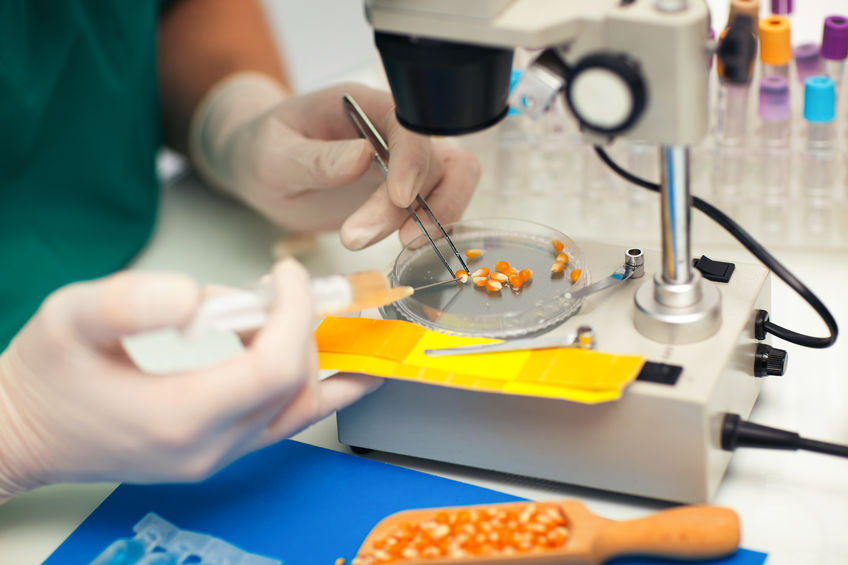
A new report has quantified the significant financial benefit of using GM crop technology to maximise agricultural productivity.
The report, which has been produced by Graham Brookes and Peter Barfoot of UK-based PG Economics Ltd, looks around the world at where GM science has been used to boost productivity and save costs.
The authors concludes that the financial benefit at farm level was $18.2 billion in 2016 alone and as much as $186.1 billion for the period from 1996 to 2016.
Some 65 per cent of the gains came from yield and production gains and the remaining 35 per cent came from cost savings.
These findings come at a time when speculation continues over whether the UK will embrace GM technology in the wake of its withdrawal from the European Union.
Farming Minister George Eustice raised the prospect of adopting GM when he said in a Parliamentary written answer shortly after the referendum vote: "As part of the preparations for EU exit, the Government is considering possible future arrangements for the regulation of genetically modified organisms."
He said: "The Government’s general view remains that policy and regulation in this area should be science-based and proportionate."
'High yield increases'
In their new report, Graham Brookes and Peter Barfoot say that in the last 21 years, crop biotechnology has helped farmers grow more food using fewer resources by reducing the damage caused by pests and better controlling weeds.
"The highest yield increases have occurred in developing countries and this has contributed to a more reliable and secure food supply base in these countries," the report says.
"In South America, HT (herbicide tolerant) technology has helped farmers reduce tillage, shortening the time between planting and harvesting, allowing them the opportunity to grow an additional soybean crop after wheat in the same growing season.
"With higher yields and less time and money spent managing pests and weeds, farmers have earned higher incomes. This has proved to be especially valuable for farmers in developing countries where, in 2016, an average $5 was received for each extra dollar invested in bio- tech crop seeds."
'Opt out'
Within the EU the issue of GM has been embroiled in political argument. In 2015 the EU granted member states the authority to “opt out” of, or effectively ban, licensing of genetically modified organisms without having to provide scientific evidence to the European Food Safety Authority (EFSA).
The opportunity to do so was seized upon by many, including Wales and Scotland, and the Scottish Government has demanded that the ban on GM should continue after the UK leaves the EU.
Defra Secretary Michael Gove insisted last November that food from GM crops would continue to be banned following Brexit, although the United States will exert pressure for such a ban to be lifted in any negotiations involving the UK's attempt to strike a post-Brexit, trans-Atlantic free trade deal.
US president Donald Trump's commerce secretary Wilbur Ross told business leaders at a Confederation of British Industry (CBI) conference in London that any post-Brexit deal with Washington would hinge on the UK being prepared to scrap the kind of rules set by Brussels.
'Best tools'
Although the NFU has been urging the Government to resist the temptation to lower quality and welfare rules in pursuit of a US trade deal, GM is something the union is open to.
The NFU's chief science and regulatory affairs adviser Dr Helen Ferrier said: “The NFU has always advocated the need to give British farmers the choice to access the best tools and technologies to grow resilient, profitable businesses and be competitive.
"British farms are part of a global supply chain, so what is happening to production around the world has an impact on them. The findings of this report are therefore of great interest and relevance to us.
"The positive economic impacts at farm level are clear from the analysis, as is the rapid rate of adoption of crop biotechnology, but cultivating GM crops remains a long way from reality in the UK.
Dr Ferrier added: "There are challenges in production, resource efficiency, environmental performance, food and feed quality and safety for which biotechnology holds genuine and exciting solutions."
'Additional land'
Graham Brookes and Peter Barfoot say in their report that the widespread use of GM crop technology is enabling farmers to grow more without needing to use additional land.
"To maintain global production levels at 2016 levels, without biotech crops, would have required farmers to plant an additional 10.8 million hectares of soya beans, 8.2 million hectares of maize, 2.9 million hectares of cotton and 0.5 million hectares of canola - an area equivalent to the combined land area of Bangladesh and Sri Lanka," they say.
"Overall, there continues to be a considerable and growing body of evidence, in peer reviewed literature, and summarised in this paper, that quantifies the positive economic impacts of crop biotechnology," they say
Their report, they say, provides insights into the reasons why so many farmers around the world have adopted and continue to use the technology.
